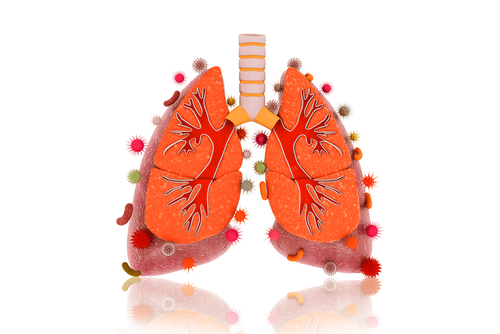A Taiwanese study demonstrated that concomitant infection with Pseudomonas aeruginosa and nontuberculous mycobacteria leads to a greater lung function decline and increased disease severity in patients with bronchiectasis.
The findings were reported in the study “Impact of concomitant nontuberculous mycobacteria and Pseudomonas aeruginosa isolates in non-cystic fibrosis bronchiectasis,” published in the journal Infection and Drug Resistance.
Pseudomonas aeruginosa is a well-known bacteria often found in patients with bronchiectasis. It is an opportunistic pathogen, taking advantage of patients’ weakened immune systems to persist in their airways.
These bacteria can cause a variety of lung infections, including pneumonia, and severe systemic infections. Bronchiectasis patients infected with P. aeruginosa have demonstrated lower quality of life, accelerated decline in lung function, and more frequent exacerbations or flares.
Bronchiectasis has also been associated with nontuberculous mycobacteria (NTM), which can cause respiratory infections and lead to progressive lung disease characterized by cough, shortness of breath, fatigue, and weight loss.
The prevalence of NTM in bronchiectasis patients ranges from 2 to 37 percent, and has increased over the years. Although researchers have gathered information about these bacteria, little is known about the effects of NTM infection in patients with bronchiectasis.
A team led by researchers at Chang Gung University in Taoyuan, Taiwan, studied 96 bronchiectasis patients admitted to the Linkou Medical Center, Chang Gung Memorial Hospital, from January 2005 to December 2014.
Medical records were analyzed regarding patients’ presentation, exacerbations, number of visits to the emergency department, hospitalization, lung function — measured as forced expiratory volume (FEV1) and forced vital capacity (FVC) — and bacterial studies. All patients were followed up upon for at least two years.
Patients were divided into four groups, according to the presence/absence of P. aeruginosa/NTM: group 1 included 41 patients who were negative for the presence of both bacteria (not infected); group 2 included 20 patients who were positive for NTM only; group 3 had 20 patients positive for P. aeruginosa; and group 4 had 15 patients infected with both bacteria.
Researchers found that patients in group 4 had the greatest decline in lung function, in both FEV1 and FVC measurements, and the most frequent acute exacerbations, number of visits to the emergency room, and number of hospitalizations.
Patients in groups 2 and 3 also showed a significant decline in FEV1 and more frequent acute exacerbations and hospitalizations, compared to group 1.
During the follow-up period, there were only nine deaths reported, and the mortality rate was not different between the four groups studied — two patients died in groups 1, 2 and 4 each, while three patients in group 3 died.
Of the 96 patients analyzed, 35 were infected with NTM species; of those, 11 patients had multiple species of NTM, while 24 had a single specimen. Researchers found no differences in NTM species among groups 2 and 4.
Overall, the results show, for the first time, that concomitant infection with P. aeruginosa and NTM worsens bronchiectasis symptoms.
“Our study showed that nontuberculous mycobacteria isolates from the sputum of non-cystic fibrosis bronchiectasis patients are associated with greater FEV1 decline and acute exacerbations. Patients with concomitant positive nontuberculous mycobacteria and Pseudomonas aeruginosa isolates have the greatest pulmonary function decline and the most frequent acute exacerbations,” researchers wrote.
The results suggest “that early recognition and prompt treatment of concomitant NTM and P. aeruginosa isolates may improve the outcome” in bronchiectasis patients, they concluded.

